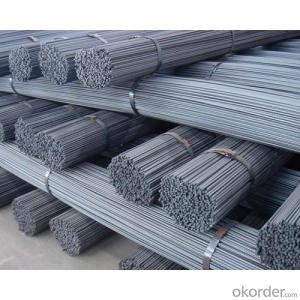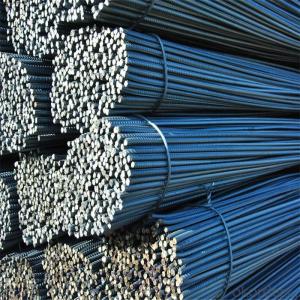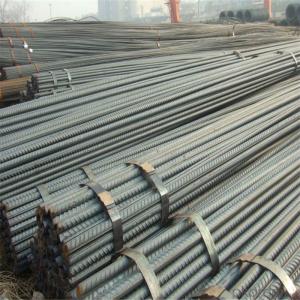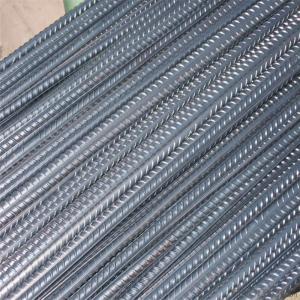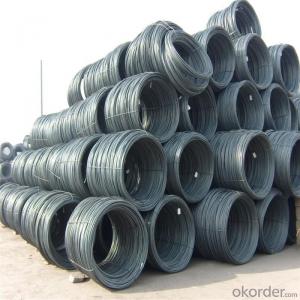Steel Rebar Production Line
- Loading Port:
- Tianjin
- Payment Terms:
- TT OR LC
- Min Order Qty:
- 150 m.t.
- Supply Capability:
- 500000 m.t./month
OKorder Service Pledge
OKorder Financial Service
You Might Also Like
Item specifice
Steel Rebar Production Line
Description of Steel Rebar Production Line
1, Diameter: 5.5mm-10mm Steel Rebar Production Line
10m- 40mm Steel Rebar Production Line
2, Length: 6m, 9m, 12m or customized
3, Standard: GB, ASTM, AISI, SAE, DIN, JIS, EN
OEM technology - send detailed technical parameters for accurate quotation.
2, Produce Process: smelt iron - EAF smelt billet - ESR smelt billet -
hot rolled or forged to get the steel round bar and plate
3, Heat Treatment: annealing, normalizing, tempering, quenching
4, Surface Treatment: Black
5, Quality Assurance: We accept third party inspection for all orders.
You can ask testing organizations such as SGS, BV, etc. to test our products before shipping.
Chemical Composition of Steel Rebar Production Line
Grade | Technical data of the original chemical composition(%) | |||||
Reinforcing steel bar HRB335 | C | Mn | Si | S | P | B |
≤0.25 | ≤1.60 | ≤0.80 | ≤0.045 | ≤0.045 | >0.0008 | |
Physics Capability | ||||||
Yield Strength(N/cm2) | Tensile Strength(N/cm2) | Elongation(%) | ||||
≥ 335 | ≥490 | ≥16 | ||||
Reinforcing steel bar HRB400 | C | Mn | Si | S | P | B |
≤0.25 | ≤0.16 | ≤0.80 | ≤0.045 | ≤0.045 | 0.04-0.12 | |
Physics Capability | ||||||
Yield Strength(N/cm2) | Tensile Strength(N/cm2) | Elongation(%) | ||||
≥ 400 | ≥ 570 | ≥ 14 | ||||
Products Show of Steel Rebar Production Line
Company Information
CNBM International Corporation is the most important trading platform of CNBM group.
Whith its advantages, CNBM International are mainly concentrate on Cement, Glass, Iron and Steel, Ceramics industries and devotes herself for supplying high qulity series of refractories as well as technical consultancies and logistics solutions.


F A Q
1, Your advantages?
professional products inquiry, products knowledge train (for agents), smooth goods delivery, excellent customer solution proposale
2, Test & Certificate?
SGS test is available, customer inspection before shipping is welcome, third party inspection is no problem
3, Factory or Trading Company?
CNBM is a trading company but we have so many protocol factories and CNBM works as a trading department of these factories. Also CNBM is the holding company of many factories.
4, Payment Terms?
30% TT as deposit and 70% before delivery.
Irrevocable L/C at sight.
5, Trading Terms?
EXW, FOB, CIF, FFR, CNF
6, After-sale Service?
CNBM provides the services and support you need for every step of our cooperation. We're the business partner you can trust.
For any problem, please kindly contact us at any your convenient time.
We'll reply you in our first priority within 24 hours.
- Q:How does special steel contribute to the hardness of products?
- Special steel contributes to the hardness of products through its unique composition and manufacturing process. It contains alloying elements such as chromium, tungsten, and manganese, which enhance its strength and resistance to wear and tear. The controlled heat treatment during production further refines the steel's microstructure, resulting in increased hardness. This hardness enables special steel to withstand high pressures, impacts, and abrasive forces, making it ideal for applications where durability and strength are crucial, such as in tools, machinery, and construction materials.
- Q:How does special steel perform under high-temperature conditions?
- Special steel is specifically designed to perform well under high-temperature conditions. It exhibits excellent resistance to thermal expansion, oxidation, and creep, allowing it to maintain its structural integrity and mechanical properties when exposed to elevated temperatures. The unique composition of special steel, which often includes elements such as chromium, nickel, and molybdenum, contributes to its high-temperature performance. These alloying elements form a protective oxide layer on the surface of the steel, known as passivation, which acts as a barrier against corrosion and further enhances its resistance to high temperatures. Additionally, the microstructure of special steel is carefully controlled through various heat treatment processes, such as quenching and tempering, to achieve optimal toughness and strength even at elevated temperatures. Overall, special steel demonstrates exceptional performance and reliability in high-temperature environments, making it a preferred choice for applications such as power generation, aerospace, and petrochemical industries.
- Q:How does special steel perform in corrosive chemical environments?
- Special steel performs well in corrosive chemical environments due to its high resistance to corrosion. It is specifically designed to withstand exposure to various corrosive chemicals, such as acids and alkalis, without deteriorating or losing its structural integrity. This makes it a reliable choice for applications in industries such as chemical processing, oil and gas, and marine environments where corrosion is a significant concern.
- Q:What are the main factors affecting the heat resistance of special steel?
- The main factors affecting the heat resistance of special steel include its alloy composition, microstructure, and heat treatment. Alloy composition plays a crucial role in determining the heat resistance of special steel. The addition of specific elements such as chromium, nickel, molybdenum, and tungsten can enhance the steel's ability to withstand high temperatures. These alloying elements form stable oxide layers on the surface of the steel, which act as a barrier against oxidation and corrosion at elevated temperatures. The microstructure of special steel also influences its heat resistance. The steel's grain size, distribution of phases, and the presence of precipitates can affect its thermal stability. Fine-grained structures and a homogeneous distribution of phases help improve the steel's resistance to creep, which is the deformation that occurs under prolonged exposure to high temperatures. Additionally, the presence of precipitates, such as carbides or intermetallic compounds, can provide strengthening mechanisms that enhance the steel's resistance to thermal softening. Heat treatment processes, such as quenching and tempering, can significantly impact the heat resistance of special steel. Proper heat treatment can optimize the microstructure and enhance the steel's mechanical properties, including its resistance to thermal degradation. For instance, a well-controlled quenching process can promote the formation of a martensitic structure, which increases the steel's hardness and strength at high temperatures. Other factors that can affect the heat resistance of special steel include the presence of impurities, surface conditions, and environmental factors. Impurities, such as sulfur and phosphorus, can reduce the steel's resistance to high temperatures by promoting the formation of brittle phases or facilitating oxidation. Surface conditions, such as roughness or the presence of cracks, can lead to localized heating and accelerated degradation. Environmental factors, such as the presence of corrosive gases or high humidity, can also influence the steel's heat resistance by promoting oxidation or corrosion processes. In summary, the heat resistance of special steel is influenced by its alloy composition, microstructure, heat treatment, impurities, surface conditions, and environmental factors. Understanding and optimizing these factors are crucial for developing special steel with superior heat resistance for various industrial applications.
- Q:What are the challenges in machining high-speed special steel?
- Machining high-speed special steel poses several challenges due to its unique properties and characteristics. One of the main challenges is its extreme hardness, which makes it difficult to cut and shape. High-speed special steel typically has a high carbon content and is heat-treated to enhance its hardness, which results in increased wear on cutting tools. The high hardness of this steel also leads to increased heat generation during machining, which can cause thermal distortion and affect the dimensional accuracy of the finished product. This requires the use of specialized cooling techniques and cutting tools with advanced coatings to dissipate heat and maintain stability. Another challenge is the brittleness of high-speed special steel. It tends to have low toughness and is prone to cracking and chipping during machining operations. This requires careful selection of cutting parameters, such as cutting speed, feed rate, and depth of cut, to prevent excessive stress and minimize the risk of tool failure. Additionally, high-speed special steel often contains alloying elements like tungsten, vanadium, and cobalt, which can further complicate the machining process. These elements increase the strength and wear resistance of the steel but also make it more challenging to machine. Specialized tool materials and cutting strategies are required to effectively machine these alloys and achieve desired surface finishes. Furthermore, the cost of high-speed special steel can be significantly higher than conventional steels, which adds to the challenges of machining. The high tooling costs associated with cutting tools necessary to machine this steel can be a significant investment. Overall, machining high-speed special steel requires advanced cutting techniques, specialized tooling, and careful consideration of cutting parameters to overcome the challenges posed by its extreme hardness, brittleness, and alloying elements.
- Q:How does special steel perform in extreme temperature conditions?
- Special steel is designed to perform exceptionally well in extreme temperature conditions. It has a high tolerance for both low and high temperatures, allowing it to maintain its structural integrity and mechanical properties even in the harshest environments. This makes special steel an ideal choice for applications that involve extreme heat or cold, such as aerospace, energy production, and industrial processes.
- Q:How does special steel contribute to weight reduction in manufacturing?
- Special steel is a type of steel that has been specifically engineered to possess certain characteristics that make it suitable for various applications in manufacturing. One of the key advantages of special steel is its ability to contribute to weight reduction in manufacturing processes. Special steel is often utilized in industries where weight reduction is crucial, such as automotive, aerospace, and construction. This is because special steel possesses a high strength-to-weight ratio, meaning it can provide the required strength and performance while being lighter in weight compared to other materials. By using special steel in manufacturing processes, companies can achieve weight reduction in several ways. Firstly, the lightweight nature of special steel allows for the production of components and structures that are significantly lighter than those made from conventional steel or other materials. This reduction in weight can have numerous benefits, including improved fuel efficiency in automobiles, increased payload capacity in aircraft, and easier handling and installation in construction projects. Additionally, special steel's high strength-to-weight ratio enables manufacturers to design and produce thinner, yet equally strong, components. This not only reduces the overall weight of the manufactured product but also allows for more efficient use of materials, leading to cost savings and a more sustainable manufacturing process. Furthermore, special steel's unique properties, such as its excellent formability and weldability, enable manufacturers to create complex and intricate designs that can further contribute to weight reduction. This versatility allows for the production of lightweight components with intricate shapes and structures, which can enhance overall performance and functionality. In summary, special steel plays a crucial role in weight reduction in manufacturing processes. Its high strength-to-weight ratio, lightweight nature, excellent formability, and weldability enable the production of lighter components and structures. By utilizing special steel, industries can achieve improved efficiency, performance, and sustainability in their manufacturing operations.
- Q:Can special steel be used for musical instruments?
- Yes, special steel can be used for musical instruments. Special steel alloys, such as stainless steel or carbon steel, can be utilized in the manufacturing of various musical instruments like drums, cymbals, or even certain parts of wind instruments. These steel alloys offer unique tonal qualities and durability, making them suitable for creating distinctive sounds and withstanding vigorous playing.
- Q:What are the factors that affect the machinability of special steel?
- The factors that affect the machinability of special steel include the composition and microstructure of the steel, hardness and strength of the material, cutting tool material and geometry, cutting speed and feed rate, coolant or lubrication used during machining, and the presence of any impurities or surface defects on the steel.
- Q:How does special steel perform in high-temperature oxidation?
- Special steel performs well in high-temperature oxidation due to its unique composition and properties. It exhibits excellent resistance to corrosion, heat, and oxidation, allowing it to maintain its mechanical strength and structural integrity even at elevated temperatures. This makes special steel suitable for various high-temperature applications, such as in power plants, automotive engines, and aerospace components. Its ability to withstand oxidation ensures long-term performance and reliability in extreme environments.
1. Manufacturer Overview |
|
|---|---|
| Location | |
| Year Established | |
| Annual Output Value | |
| Main Markets | |
| Company Certifications | |
2. Manufacturer Certificates |
|
|---|---|
| a) Certification Name | |
| Range | |
| Reference | |
| Validity Period | |
3. Manufacturer Capability |
|
|---|---|
| a)Trade Capacity | |
| Nearest Port | |
| Export Percentage | |
| No.of Employees in Trade Department | |
| Language Spoken: | |
| b)Factory Information | |
| Factory Size: | |
| No. of Production Lines | |
| Contract Manufacturing | |
| Product Price Range | |
Send your message to us
Steel Rebar Production Line
- Loading Port:
- Tianjin
- Payment Terms:
- TT OR LC
- Min Order Qty:
- 150 m.t.
- Supply Capability:
- 500000 m.t./month
OKorder Service Pledge
OKorder Financial Service
Similar products
New products
Hot products
Hot Searches
Related keywords
